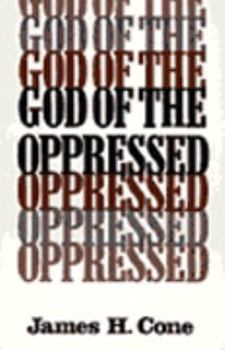God of the Opressed
Select Format
Select Condition 
Book Overview
A landmark in the development of Black Theology and the first effort to present a systematic theology drawing fully on the resources of African-American religion and culture. This description may be from another edition of this product.
Format:Paperback
Language:English
ISBN:0816426074
ISBN13:9780816426072
Release Date:January 1978
Publisher:HarperOne
Length:288 Pages
Weight:0.47 lbs.
Customer Reviews
4 ratings
Mandatory Reading for Those Who Believe That Real Christians Do Not Suffer
Published by Thriftbooks.com User , 17 years ago
James Cone develops a perspective on Black Theology in God of the Oppressed, by looking directly through the lens of Liberation Theology. He formulates an argument against the oppression of the poor by virtue of "divine love or divine power," which is heavily influenced by the Bible. The question of God's presence in the face of racism, oppression, depravity of social and economic power and the perpetual suffering experienced by many blacks throughout the Diaspora is raised. If the Christian God is truly the one who liberated Israel from the Egyptians, if this is the same Jesus who had compassion for the poor and the marginalized in the world, then we need to know why God does not act to eliminate the suffering, especially amongst black people. Some might be willing to deny God's benevolence and God's sovereignty, but Cone declares that to do this would deny an essential element of black faith. "It is a violation of black faith to weaken either divine love or divine power;" therefore, there must be an alternative. This is consistent with a view of God as the Creator who loves and cares for that which God created. The bible is of primary importance to James Cone's perspective on suffering. He utilizes scripture to reconcile the suffering of the "innocent and weak" with the Bible's claims that God is a liberator of the poor and a protector of the weak. In God's relationship with the Hebrew slaves, we see God's preferential option for the poor being exercised. It is God who tells Moses that he should go to Pharaoh and declare, "Let my people go." It is Israel's story of faithfulness to a faithful God in spite of their oppression that leads to the liberation of the Hebrew slaves. It is God's love for the people of God that serves as the motivation to free Israel. Still, intertwined in this liberating and loving God, there was always suffering. Cone affirms that evil (suffering) exists. Noted theologians like Calvin attest to this as well, but without the purpose that Cone attaches to it. There are precious many Psalms of lament. Psalms that speak both of the great, benevolent, loving God and at the same time lament the treatment of the orphan and the widow who are slain at the hand of the wicked. "O Lord, how long shall the wicked, How long shall the wicked exult?" (Psalm 94:3 RSV) The problem, according to Cone, is not the presence of suffering in Scripture, but the distribution of suffering. I could say more, but you ought to read this book for yourself... Grace and Peace
Very Scholarly review
Published by Thriftbooks.com User , 17 years ago
I have just finished rerading Dr Cone's "God of the Oppresseed" It is a very good book because he parallels the Exodus from Egypt to Israel, the land of milk and honey; with the Exodus of Black Americans from slavery. He understands that "The least of these" relates to Black of Americans. Dr Cone reviews the signifiance of the black church and spirituals with the survivals of blacks. He very astututely points out the errors when white theologians do not consider Black Americans when they speeak of the oppressed. Dr. Cone shows the real meaning of the crucifixtion and resurrection and how it relats to blacks. Darrell Pone,MD Old Westbury, NY
Interesting, but...
Published by Thriftbooks.com User , 20 years ago
Cone has a lot of great perspectives to offer in this book, which some may find offensive (as is Cone's tendency) but should also offer new ways of thinking about such important issues in our world today. His writing style is full of personal anecdotes, tales, and excerpts from sermons or songs, making this book an easier read.However, though he starts off very strong in his assertions, he often does not follow-up to the degree that he began with. It is sometimes difficult to fully understand Cone's answers to pertinent questions.As the book gets farther on, this becomes more and more noticeable, with several contradictions (and fits of anger) popping up in the final chapters.This is a good read, especially for those concerned with racism and how it relates to the Bible (or oppression in general), though the reader should be aware that some areas are not very clear.
A Challenging Perspective
Published by Thriftbooks.com User , 23 years ago
This book is a must read for those who come from a conservative anglo-american background. It helped me to realize the way that my culture has often distorted my understanding of God's work, and it opened my eyes to new ways of viewing God that are challenging but refreshing. As racial reconciliation becomes a larger issue in the church today, this book is important for all laypeople who are serious about reconciling.





